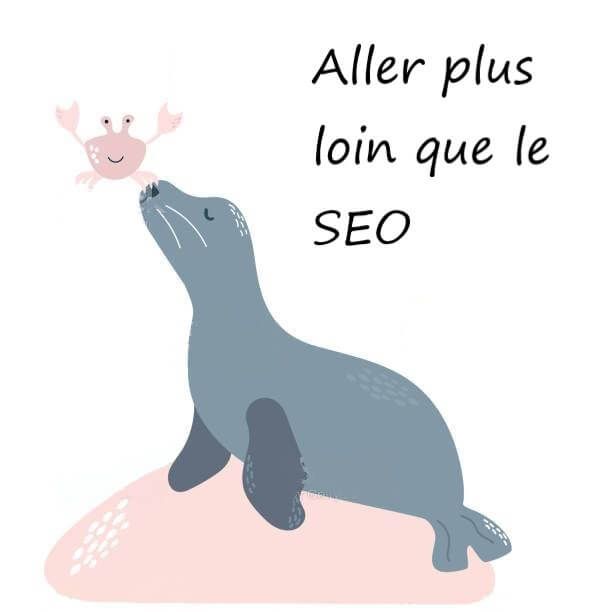Semantic SEO
The power of natural language to optimize your Google positions
Making sense of your content and search engines
There semantic seo is a content optimization strategy that provides valuable information to search engines. It is based on detail, accuracy, and relevance.
Boost your online visibility with Semantic SEO
THE semantic referencing is an approach to natural referencing which aims to improve the optimization of a website by relying on natural language processing methods.
The aim is to improve the
understanding of website content by search engines
while providing your readers with
meaningful and qualitative content.
SEO Sémantique, de quoi parle-t-on ?

Use the
Semantic SEO
therefore aims to optimize the ranking of a site or web page in search engines by creating content that provides relevant and complete answers to users' online queries.
This
strategy
is therefore
useful for internet users
but also, and above all,
for search engines.
Language is made up of various codes, signs and ambiguities.
When you query a search engine, you will find that it understands our language without any difficulty. How is this possible? Thanks to the NLP (Natural Language Processing), also known as TALN (Natural Language Processing).
Search engines now use this knowledge to provide more personalized and accurate results.
Semantic study in SEO
In SEO, a semantic study, also called semantic analysis , refers to the analysis of keywords and concepts related to a particular domain or topic with the aim of optimizing a website's content for search engines.
This approach is based on the understanding semantic relationships between words and sentences , rather than just keyword matching.
Here is what a semantic study in SEO generally includes:
- Semantic keyword research: Instead of focusing only on specific keywords, a semantic study aims to identify a set of related and relevant keywords that revolve around a topic. This includes synonyms, word variations, long tail keywords, etc.
- Search Intent Analysis: Understanding why users search for a given topic is crucial. Semantic research attempts to determine the search intent behind each query, whether it’s to get information, buy a product, or perform some other action.
-
Structuring the content: Once keywords and search intent are identified, semantic research helps structure website content to comprehensively meet user needs. This often involves creating high-quality, informative content.
-
Optimizing HTML semantics: Semantic study also includes optimizing the HTML semantics of the website. This means the proper use of HTML tags, such as heading tags (title, h1, h2, h3, etc.), list tags, semantic tags to help search engines understand the structure and meaning of the content.
- Contextualization and internal links: finally, semantic analysis guides search engines and readers by working on creating internal links between the pages of the website, linking relevant content to each other. This aims to strengthen the overall semantic relevance of the site.
The main goal of semantic SEO research is to create a website that is not only optimized for keywords, but also provides a useful and relevant experience to users.
Search engines, especially Google, are placing increasing emphasis on semantic understanding of content to provide better quality search results based on user search intent.
-
The benefits of semantics in SEO
Giving meaning to your content
Being understood by search engines
Gain relevance and authority
NER, Named Entity Recognition
Our ability to understand and interpret words and texts relies on our linguistic skills and knowledge. This allows us to classify words based on aspects such as individuals, places, and beliefs. As a result, we can quickly identify, classify, and understand the meaning of a word in a specific context.
Computers do not have the innate ability to recognize and classify words or texts. To address this, the named entity recognition
(NER) is used to automatically identify and classify meaningful components of a text, such as proper names, places, and organizations.
NER is a core component of natural language analysis, enabled by machine learning and deep learning techniques.
What are named entities?
According to Kristian Balog, a named entity East " A object or thing that can be uniquely identified . It is characterized by its name(s), its type(s), its attributes and its relationships with other entities ", source Entity Oriented Search .
Typology of named entities
Named entities are divided into primary types, here are the most important:
- People
- Places
- Organizations
- Time and period
- Quantities
- Products
- Functions.
Getting loved by Google
Named entities, often neglected and considered esoteric, are of great importance in SEO. Indeed, those who enrich knowledge bases, improve entity recognition and explore information will attract Google's favor.
Understanding named entities and their relationships helps search engines understand your search intent. They can thus analyze the content of your web pages and understand you better, as a human being would do during a conversation.
When Google interprets and understands your content, it significantly influences your SEO ranking, provided you also focus on the other two pillars of SEO, namely technique and popularity.
Meet search engine expectations
Google can analyze whether your document contains unique information. If your content covers a topic comprehensively and provides a unique, in-depth level of expertise, you meet the search engine's expectations.
By showcasing your knowledge and providing a global perspective, you establish yourself as an authority in your field.
Google, semantic search engine
Entities, such as people, places, and objects, make up the building blocks of our world. They also constitute semantic, geospatial and descriptive reference points for search engine algorithms. This is why named entities play a crucial role in semantic search.
With Google operating as a semantic search engine, understanding the concept of named entities gives us insight into a small part of how the search engine works.
A semantic search engine goes beyond analyzing individual words on a page and instead focuses on identifying entities and their relationships. Google is primarily interested in topics, concepts and elements mentioned on a page rather than specific words.
Content should be structured by topic rather than keywords to align with the entity approach. It's important to show Google that your page provides complete information on a particular topic, including references to all relevant entities.
If your website isn't organized on an entity basis and you're still focusing on "keywords", that might be why you're struggling to improve your SEO.
Using structured data to remove ambiguity
To help the search engine better understand your content, there is nothing better than using a specific form of language: structured data.
Using markup schema.org, you remove ambiguities and are better understood by the Californian giant (and other search engines).
What is structured data?
THE structured data are machine-readable information.
They provide specific details about entities and their relationships
within a content element. They are presented in a standardized format, based on a reference, so that
search engine robots can understand them
3 structured data formats exist:
- JSON-LD
- Microdata
- RDFa.
Why choose an SEO consultant?
specialized in semantics?
SEO is above all a work of passion, which requires time, observation and perseverance.
SEO is constantly evolving, it is a macrocosm filled with microcosms linked to the multiple updates of the Californian giant and advances in artificial intelligence (AI).
How to do SEO well, It is understanding the search intent detected by Google.
THE
semantic referencing
is an SEO approach that focuses on optimizing a website through the use of natural language processing techniques. The goal is to improve search engines' understanding of the website's content.
Addictive, the
SEO requires perseverance
,
humility and know-how
.
A semantic strategy in local SEO
This semantic strategy based on named entities and JSON-LD encoding applies to the
local SEO.
The integration of semantic technologies such as
Schema Markup
in your
local strategy
can give you a competitive advantage while still allowing you to benefit from traditional SEO practices like keyword research.
Benefits of choosing a Semantic SEO consultant
There are undeniable advantages to implementing a semantic-based SEO strategy.
Choosing a “semantic SEO” consultant allows you to:
- Increase the relevance of your web pages.
- Create relevance and completeness in your content.
- Gain visibility.
But there are many other benefits that the semantic SEO consultant brings to your business:
- Gain geographic and targeted visibility for your establishment.
- Demonstrate your authority to search engines.
- Gaining popularity through words and their proper use.
- Creation of thematic clusters.
- Holistic SEO advice and monitoring.
- Semantic analysis of your competitors.
- Implementation of a strategy adapted to your activity.
Anticipating tomorrow’s generative research
Your content becomes more visible and understandable to intelligent systems based on generative AI.
Semantic search is already shaping the future of search.
With the rise of
AI-powered generative search engines
, as
Google Search Generative Experience
, semantic technology has reached new heights.
In this era of AI transformation and generative search, search engines are gaining an unparalleled ability to understand the subtleties and meaning of human language. Therefore, the
Semantic SEO
takes
all its meaning
.
Improve your SEO with a semantic SEO consultant
Contact
Have a question? I'm here to help. Send me a message!
Contactez-nous








